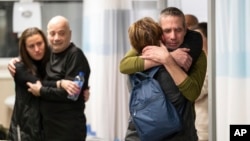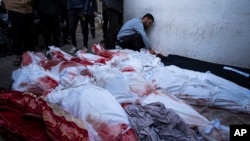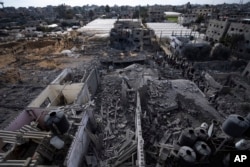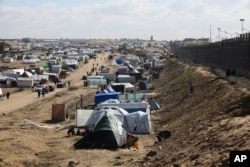Israel freed two hostages held by Hamas militants in Rafah on Monday, but supporting airstrikes killed at least 67 Palestinians in the southern Gaza city where about 1 million displaced civilians have sought refuge from four months of bombardments.
Israel’s military, the Shin Bet security service and a special police unit said they rescued two men — Fernando Simon Marman, 60, and Louis Har, 70 — who held dual Israeli-Argentine citizenship. The two were among the 240 or so hostages seized by Hamas in the militants’ October terror attack on Israel that killed 1,200 people and triggered Israel’s counter-offensive.
Four months on, Gaza health officials say that more than 28,000 Palestinians have been killed and nearly 68,000 wounded, with much of the narrow territory along the Mediterranean Sea left in ruins by the Israeli air and ground attacks.
Israeli Prime Minister Benjamin Netanyahu praised Monday’s hostage rescue operation, dismissing international protests about his plans for a ground attack to root out four Hamas battalions in Rafah.
"Fernando and Louis, welcome home," he said, saluting the Israeli forces who rescued them. "Only continued military pressure, until total victory, will bring about the release of all of our hostages."
An Israeli military spokesman said the hostages were being held on the second floor of a building that was breached with explosives during a raid amid heavy exchanges of gunfire with militants in surrounding buildings.
"We've been working a long time on this operation," Lieutenant Colonel Richard Hecht said. "We were waiting for the right conditions."
Netanyahu said over the weekend that displaced people sheltering in Rafah will be provided “safe passage” out of the area, but he has given no details on where they would be moved.
The United Nations said Monday it would not help Israel move Palestinians away from Rafah.
“What we want is to ensure that anything that happens is done in full respect of international law; in the full respect of the protection of civilians,” said U.N. spokesman Stephane Dujarric. “We will not be party to forced displacement of people. As it is, there is no place that is currently safe in Gaza.”
Hamas, a U.S. designated terror group, is believed to be holding about 100 hostages still, after 100 were released during a weeklong cease-fire in November. The Israeli military says 31 have died or were killed during their captivity.
The Hamas-run Gaza Health Ministry said the death toll of Palestinians killed overnight in the Israeli attacks could rise as rescue operations continue. A Reuters journalist at the scene saw a vast area of rubble where buildings, including a mosque, had been destroyed.
"I've been collecting my family's body parts since the morning,” said Ibrahim Hassouna, as a woman knelt over the body of a young child nearby. "I only recognized their toes or fingers."
Repeated Israeli evacuation orders have pushed Palestinian civilians farther and farther south in Gaza, with many living in tent camps and overcrowded United Nations shelters in the Rafah area.
But with Rafah located at the southwestern edge of Gaza along the Egyptian border, the shift in Israel’s focus of operations from northern Gaza to areas in the south has raised international concerns about where Palestinians can safely go.
Meinie Nicolai, director general of the medical aid group Doctors Without Borders, called Monday for Israel to halt its offensive in Rafah and for other countries to “take concrete action” to bring a sustained cease-fire.
“Nowhere in Gaza is safe, and repeated forced displacements have pushed people to Rafah, where they are trapped in a tiny patch of land and have no options,” Nicolai said in a statement.
U.S. President Joe Biden spoke to Netanyahu by phone Sunday and told him Israel shouldn’t go forward with a military operation in Rafah without “a credible and executable plan for ensuring the safety of and support for the more than 1 million people sheltering there,” a White House statement said.
Netanyahu, in an interview broadcast Sunday on ABC’s “This Week” show, reiterated his intention to order Israeli troops to attack Hamas battalions in Rafah, saying victory cannot be achieved over the militants in Gaza without clearing them out of the town on the Egyptian border.
When asked where the Palestinians — many already sheltering in makeshift tents — would go, Netanyahu said only that Israeli officials are "working out a detailed plan."
German Foreign Minister Annalena Baerbock wrote on X, "The people in Gaza cannot disappear into thin air," adding that an Israeli offensive on Rafah would be a "humanitarian catastrophe in the making."
British Foreign Secretary David Cameron said he is "deeply concerned" about the prospective offensive.
"The priority must be an immediate pause in the fighting to get aid in and hostages out,” Cameron wrote on X.
An Israeli ground offensive into Rafah could have other repercussions, as well.
Hamas-run Al-Aqsa television quoted a senior Hamas official as saying any Israeli ground offensive into Rafah would "blow up" negotiations for a halt in the fighting and the possible release of the remaining 100 hostages held by the militants, who have been designated a terror group by the United States, Britain and the European Union.
The U.S. said Monday that an extended cease-fire, along with the release of more hostages in exchange for Palestinians jailed by Israel, remains possible.
"We do believe that a deal is possible and we're going to continue to pursue," State Department spokesman Matthew Miller told reporters.
"We think the benefits of a pause and a deal for hostages are tremendous, not just obviously for the hostages who would be released but also for the humanitarian effort in Gaza and for our ability to begin to pursue a real and lasting, sustainable resolution of this conflict," he said.
Egyptian officials have warned that any ground operation in Rafah or mass displacement across the border would undermine its 40-year-old peace treaty with Israel.
It is also the main humanitarian aid entry point to Gaza, and intense fighting could further hamper relief efforts.
Egyptian Foreign Minister Sameh Shoukry warned that any Israeli ground offensive on Rafah would have “disastrous consequences,” claiming that Israel aims to eventually force the Palestinians out of their land.
The dire humanitarian situation has sparked Arab and U.N. concerns that Palestinians may eventually be driven over the border. Egypt has sent about 40 tanks and armored personnel carriers to northeastern Sinai within the past two weeks as part of a series of measures to bolster security on its border with Gaza, two Egyptian security sources said.
Some information for this story came from The Associated Press, Agence France-Presse and Reuters.
Editor's note: An earlier version of this story incorrectly rendered Louis Har's last name. VOA regrets the error.









